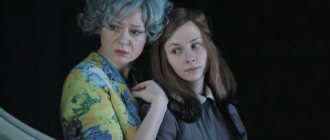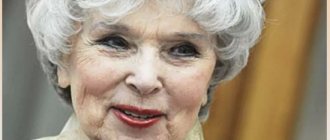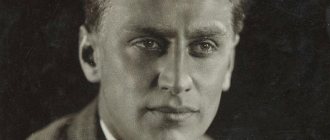The great Russian actress Vera Maretskaya was born on July 31, 1906 in the village of Barvikha, so familiar to the current generation of Russians. Her father P. G. Maretsky was a small private entrepreneur - he rented a buffet, and despite the fact that he was not a rich man, he provided his four children with an excellent education - the two eldest sons graduated from the Institute of Red Professors, Vera Petrovna herself entered Moscow University at the Faculty of Philosophy, the youngest my sister became a teacher. By this time, Vera spoke quite fluently in German and French.
The choice is made
Vera Maretskaya, after studying for a year at the university, realized that all she needed in life was theater, and secretly from her parents, she applied to three theater studios at once, was accepted into two and chose a very popular studio school at the time at the theater named after. Vakhtangov.
She was a talented, spontaneous girl, naturally intelligent and erudite, in a word, charming, despite the fact that she never considered herself a beauty. And the magnificent Yu. Zavadsky, who was on the jury, could not resist her charms. He was just thinking about his own team, and after graduating from the studio school in 1924, Vera Maretskaya would forever connect her creative destiny with the theater of this talented director.
Maretskaya, Vera Petrovna
Vera Maretskaya was born in the village of Barvikha, Moscow province (now Odintsovo district, Moscow region) into a wealthy middle-class family of peasant origins at that time[3]. Father Pyotr Grigorievich served in the buffet at the Vvedensky People's House, then kept the buffet at the Nikitin circus, and after the revolution he served as a barman at the State Circus. Mother Maria Vasilievna was a housewife. In addition to Vera, the family had three more children: daughter Tatyana and two sons, Dmitry and Gregory[3].
Since childhood, Vera took part in home performances. The parents insisted that their daughter, after graduating from school, enter the Faculty of Philosophy at Moscow University, where Maretskaya studied for a year. Then, secretly from her parents, she submitted documents to three theater studios and entered the studio school at the Vakhtangov Theater (now the Boris Shchukin Theater Institute). After the death of Yevgeny Vakhtangov in 1922, Yuri Zavadsky taught the students[2].
In 1924, Maretskaya graduated from the studio[1]. In the same year she became Zavadsky's wife. Together they participated in the creation of the Yuri Zavadsky Theater-Studio, in which Maretskaya served until 1936 as a prima. The theater did not have a permanent premises; performances took place in basements[1][2].
Maretskaya was so able to transform herself on stage that she was given age-appropriate roles, which she coped with well - for example, Madame Sokovnina
from the play “A Simple Thing” (1927) by Boris Lavrenev. None of the spectators could even think that the funny old woman was being played by a young girl.
But real fame came to her after filming a movie. In 1924, she made her debut in an episode in Ivan Khudoleev’s melodrama “Simple Hearts.” A year later, she starred with Yakov Protazanov in the drama “His Call” in the role of the girl Varya
.
In the same year, the director invited her to play the main role of housekeeper Katya
in his famous comedy “The Cutter from Torzhok”
[3]
.
After this, the actress began to receive a variety of offers. In 1928, she played a similar role as housekeeper Parasha
in Boris Barnet’s film comedy “House on Pipeline”.
In 1936, a campaign began to abolish “overly colorful, unorthodox theaters” and “transfer” them to other cities[3]. As a result, the director and the entire troupe, including Vera Maretskaya, moved to Rostov-on-Don, where Zavadsky headed the Academic Drama Theater named after. M. Gorky[1]. There Maretskaya announced herself in the role of Lyubov Yarovaya
in the play of the same name based on the play by Konstantin Trenev.
In 1937, both of Maretskaya’s brothers, journalists (one worked for Pravda, the other was deputy editor of Komsomolskaya Pravda) and associates of Nikolai Bukharin, were arrested and executed [2][4][5]. Alexandra Maretskaya took care of raising her nephew. This did not stop her from playing the main and most famous role in the film “Member of the Government” [2].
"Member of the Government"
In 1939, film directors A. G. Zarkhi and I. E. Kheifits staged the drama “Member of the Government” at the Lenfilm film studio, which was released in 1940[6]. Vera Maretskaya played the heroine of the film, Alexandra Sokolov. Many years later, in 1983, in an interview with a correspondent for Ogonyok magazine, film director A. G. Zarkhi said:
| Everyone at the studio was surprised when we invited Vera Maretskaya to play the role of Alexandra Sokolova! The stereotype of perception suggested the actress’s vision of a “heroic role.” And Kheifits and I went not only from the image read in Vinogradskaya’s script: “... beaten by her husband, scared by her priests, shot by her enemies,” but also from the powerful, broad acting personality of Vera Maretskaya. Moreover, we subordinated the decision to the script to the creative capabilities of the artist. That is why Maretskaya, with the truth of her existence, the inspiration of a great poetic feeling, became so understandable and close to everyone [7]. |
This picture tells the story of a former farm worker, Russian peasant woman Alexandra Sokolova. She is entrusted with leadership of the collective farm, but many, including her husband, do not believe in a woman’s ability to manage the farm of the artel. She does not retreat from the difficulties of collectivization, fights lazy people, supports the best workers, and sends young people to study. And the day comes when the former farmhand is elected as a deputy of the Supreme Council[8].
The magazine “Soviet Screen” for 1957 said: “The creation of the image of Alexandra Sokolova was rightly called at one time a huge creative victory for the talented actress Vera Maretskaya. She is artless and convincing from the very beginning of the film, when a mounted policeman leads a “troublemaker” to the regional center. She moves me to tears in the finale, speaking from the podium as a deputy of the Supreme Council."
[9].
Pre-war and war years
In 1940, Yuri Zavadsky was invited as the main director to the Mossovet Theater, where Maretskaya moved with him as a leading actress. She played in this theater until the end of her life and, according to colleagues, had a great influence on Zavadsky and resolved many issues, for which she received the nickname “the mistress of the theater”[2].
During the Great Patriotic War, the theater was evacuated to Alma-Ata, where in 1943 she played one of her best film roles in the film “She Defends the Motherland.” During filming, news came about the death of her second husband Yuri (George) Troitsky (or Trosha, as she called him), which was a terrible blow for her; she never remarried[2] [3]
.
Since the 1940s, she worked on the radio: she began playing radio plays with Osip Abdulov, but her duet with Rostislav Plyatt became most famous. In addition, many poems by Russian poets were recorded in her performance. [3]
.
"She defends the Motherland"
In 1943, film director F. M. Ermler staged the drama “She Defends the Motherland” at the Central United Film Studio in Alma-Ata (TSUKS), which was released in May of the same year [10] [11]. The actress starred in the role of the heroine Praskovya Ivanovna Lukyanova, who organized a partisan detachment and began to mercilessly take revenge on the enemy.
A still from the film “She Defends the Motherland,” when the Germans are about to execute V.P. Maretskaya (based on the film by Praskovya Lukyanova, comrade “P”). 1943.
When filming was coming to an end, a funeral service for her second husband arrived at the film studio addressed to Maretskaya. According to the recollections of the director of the TsOKS M.V. Tikhonov, he immediately woke up F.M. Ermler and informed him about the misfortune. The film director, meanwhile, had to film the last episode in the pavilion, and then he turned to Tikhonov with a proposal to give him a telegram and warn the duty officer “not to tell anyone about it”
.
M.V. Tikhonov came to the pavilion, where he handed over a telegram to F.M. Ermler. Tikhonov further reported: “I quickly left.
And Ermler, as he later told me, went to the head of the telegraph to persuade him to paste another tape indicating the new day and hour for receiving the telegram. During the night shift, the film laboratory developed and printed the positives of this shooting. After watching it on the screen, Ermler went to Vera Petrovna’s hotel to give her a telegram and try to somehow support her morally. Vera Petrovna locked herself in her room for several days and alone experienced her grief” [12]. Vera Maretskaya herself said:
| I went to the studio to watch the film as if it were a holiday, like a great exam, and I was very worried. But after watching, people looked past me, no one spoke to me, my comrades lowered their eyes when I glanced in their direction. How strange our art is, I thought to myself then, obviously I played poorly, but I myself had a feeling of such truth in what I did. And only the next day I learned the reason for the silence of my comrades. The day before, news was received about the death of my husband at the front, and my friends did not show it to me on the day the film was delivered[13]. |
The head of the Propaganda and Agitation Department of the Central Committee of the All-Union Communist Party of Bolsheviks, G. F. Alexandrov, in his memo dated May 11, 1943, to the Secretary of the Central Committee of the All-Union Communist Party of Bolsheviks, A. A. Andreev, concluded that the authors of the film were able to “show the Soviet people with all the strength of their souls hating German invaders"
.
He also noted the shortcomings of the film. G. F. Alexandrov ended his report with the words: “On the whole, the film will be useful.
It is advisable to release the film on screen” [14].
According to the memoirs of M. V. Tikhonov, the film “She Defends the Motherland” “was a stunning success both at the front, in the partisan regions, and in the rear”
[15].
The Star newspaper wrote: “With Praskovya Lukyanova, an image appeared on the horizon of European history and culture that has no precedents either in Western literature or cinema”
[16].
The Minister of Cinematography of the USSR I. G. Bolshakov gave the following assessment: “The actress V. Maretskaya managed to create a strong image of a simple Russian woman, a patriot who passionately loves her Motherland and is merciless in sacred revenge against her enemies”
[17]. In 1946, the film received the Stalin Prize, II degree.[11]
"Rural teacher"
In 1947, the drama “The Village Teacher” was released, directed by film director M. S. Donskoy based on the script by M. N. Smirnova[18][19]. Maretskaya acted as the heroine of the film - teacher Varvara Vasilievna Martynova, who is her best film role[20]. She played the life of her heroine in the film, from a young girl to an elderly woman, while the actress managed to maintain vital and psychological authenticity throughout the entire film [20] [16]. Maretskaya did not wear a wig, limiting herself only to dyeing her hair and changing her hairstyle[16].
The Minister of Cinematography of the USSR I. G. Bolshakov considered the film “The Village Teacher” “one of the best films about the Soviet intelligentsia created in the post-war period”
[19]. He wrote:
| The great success of the film is due, in addition to the good qualities of the script and the skill of the director, to the excellent performance of V. Maretskaya, who created a deeply moving, romantically colored image of a rural teacher. V. Maretskaya is one of the capable actresses of our cinema. She played many roles in various films, but the performance of this role is, without a doubt, the most successful. I admire the art of V. Maretskaya, who depicts with equal verisimilitude a young girl, an adult woman, and an aging man. But the main merit of the actress is that she conveyed with extraordinary expressiveness the rich inner world of her heroine, her spiritual growth, and the development of her character. The peculiarity of this image is that it is shown in the development of his rich inner world, in overcoming difficulties, in the struggle for his ideals[21]. |
For the film “The Village Teacher”, the Council of Ministers of the USSR in 1948 awarded Vera Maretskaya the Stalin Prize of the 1st degree in the amount of 100 thousand rubles[22].
Subsequent years
The grave of V.P. Maretskaya at the Novodevichy cemetery
In order to distract herself and not pay attention to the constant headaches, she worked from morning to night. But the disease made itself felt, and after examination she was diagnosed with a “brain tumor”[2].
The last role was in the play “The Strange Mrs. Savage.” This was followed by a second operation, after which the actress briefly returned to the stage, but could no longer work at full capacity.
On August 17, 1978, Vera Petrovna Maretskaya died. She was buried in Moscow at the Novodevichy Cemetery (site No. 2)[23].
Wife and mother
Her personal destiny was also connected with him for many years, although they did not live long in an official marriage. Mutual understanding and friendship united them until the end of their days - Yu. A. Zavadsky died first, a year later Vera Petrovna.
Vera Maretskaya gave birth to a boy in 1926, who was named Evgeniy in honor of Vakhtangov. Having matured, he dreamed of architecture, but at the insistence of his mother, and she was a powerful woman, he entered GITIS. He devoted his whole life to the theater of his father and mother, but never left their shadow.
Sister
By the time Yu. Zavadsky left V. Maretskaya, in addition to little Zhenya, she had in her arms the even smaller Shura, the son of Dmitry’s arrested brother. She raised Sasha as her own child.
Both journalist brothers were shot on the same day in 1937. To Vera Petrovna’s credit, she did not disown them, but, being constantly under threat of arrest as a relative of the enemies of the people (they were accused in the Bukharin case), always helped them with parcels and in general as best she could.
Nationality
By this time, Vera Maretskaya was a famous, beloved, titled actress. Her creative destiny was much luckier than her personal one. An artist of enormous talent, who could play any role, who played equally beautifully, above all praise, a partisan in the film “She Fought for the Motherland” and midwife Zmeyukina in “The Wedding”, she played all the characteristic roles in the theater, and always with constant success (more before the war we went to Maretskaya).
She could handle roles of all types; she simply and naturally played women of any class, of any nationality. Vera Maretskaya was Russian by nationality. And Rostislav Yanovich Plyatt, the smartest and most intelligent person who loved Vera Petrovna for many years, said that there is only one nationality in the world - a good, decent person. And then, the phrase of Alexandra Sokolova (“Member of the Government”), known to absolutely everyone - “Here I stand before you, a simple Russian woman...” - after all, it was Maretskaya who uttered it, and quite justifiably.
Titles and awards
- Stalin Prize of the second degree (1942) - for performing the title role in the play “Nadezhda Durova” by A. S. Kochetkov and K. A. Lipskerov.
- Stalin Prize of the second degree (1946) - for his performance as Praskovya Ivanovna Lukyanova in the film “She Defends the Motherland” (1943).
- Stalin Prize, first degree (1948) - for the role of Varvara Vasilievna Martynova in the film “The Village Teacher” (1947).
- Stalin Prize of the second degree (1951) - for the performance of the role of Kapitolina Andreevna Solntseva in the play “Dawn over Moscow” by A. A. Surov.
- Order of the Badge of Honor (1940).
- three Orders of the Red Banner of Labor (1944, 1947, 1960).
- two Orders of Lenin (1967, 1976).
- medals
- Honored Artist of the RSFSR (1935).
- People's Artist of the RSFSR (1943).
- People's Artist of the USSR (1949)
- Hero of Socialist Labor (1976)
Film actress
Vera Maretskaya, whose personal life was inextricably linked with the theater, did not act very much in films - only 25 films. However, these were such impressive works that Maretskaya the film actress was known and loved by the whole country. Her talent was so powerful that even in the propaganda film “Member of the Government,” she made her heroine such a living woman that many generations believed and loved her, despite the change of power in the country.
The first film in which V. Maretskaya played was “The Cutter from Torzhok” by Yakov Protazanov, released in 1925. In this film, Igor Ilyinsky, an already recognized actor who spoke well of his partner’s work, played with the young charming Verochka.
First film roles.
In 1925 she played in the film The Cutter from Torzhok
(director Ya.A. Protazanov) the role of Katya, a cheerful girlfriend of a local cutter.
It was performed by I. Ilyinsky, who recalled that he played the role, trying to achieve complete internal transformation, and the young Maretskaya simply and organically lived in the image of Katya, rinsing clothes in a rustic way, husking sunflower seeds or vigorously inflating the samovar. She quickly understood the difference between the truth of theater and cinema: if in the theater it is sometimes possible to act out, then in cinema you need to get by with a minimum of funds. “A barely noticeable movement of the lips or a twinkle in the eyes is enough for the viewer to understand everything,” she said. Protazanova considered her “godfather” in cinema. In 1928, in the film House on Trubnaya
, (dir. B. Barnet) she played a kind of “continuation” of Katya - the housekeeper Paranya, one of her favorite roles.
In Parana, Maretskaya was interested in the development of the character of a village girl who came to the city. These roles, as well as the role of “Varka the Devil,” who turned from a downtrodden orphan into an underground woman ( Generation of Winners
, 1936) were called sketches for Maretskaya’s future large-scale heroines. They revealed one of the characteristics of the actress - the sublime in her work coexisted with the comical and down-to-earth, without dimming, but acquiring greater volume. She starred in 15 silent films and continued to successfully act in sound films, unlike many silent film stars.
Second marriage
Before the war, Vera Maretskaya, whose filmography, as mentioned above, is not very large, starred in 10 films. It was also affected by the workload on the stage, and the fact that Yu. A. Zavadsky’s studio was sent to Rostov-on-Don, supposedly to raise the peripheral theater. The troupe left in 1936 and returned in 1940. In the same year, Vera Petrovna married an artist of the same theater, G.P. Troitsky, and a year later their daughter Mashenka was born. Georgy Petrovich goes to the front as a volunteer and dies in 1943. Maretskaya was not informed about his death until the end of filming the scene in which the great V.P. (that was her name in the theater) played with her son (“She fought for the Motherland”). This film was shown on all fronts of the Great Patriotic War and was incredibly popular. After watching it, people were eager to fight.
Zavadsky Theater-Studio in Rostov-on-Don.
Also on topic:
THEATER NAMED AFTER MOSSOVET
At Zavadsky's theater-studio she played poignant roles - from the eccentric and grotesque elderly maid Clemency (in the play The Battle of Life
according to Charles Dickens) to the satirically pointed Schnutchen (
Compass
, or
Business Man
by V. Hasenclever) and the courtesan Karina in the play
Mine
based on the play by Ben Jonson
Volpone
.
But the biggest event of that period was the role of Glafira from the play Wolves and Sheep
by A.N. Ostrovsky. The performance was based on an open stage technique, “theater within a theater.” The role of the hanger-on came to the fore thanks to Maretskaya’s sparkling performance. Colossal optimism in life distinguished this role and all subsequent ones.
The next stage in the actress’s work was work in the new theater in Rostov-on-Don, which Zavadsky headed in 1935. The theater required the search for new means of expression and spatial solutions that corresponded to the huge size of the stage and hall. The 1936–1937 season was opened with the play Lyubov Yarovaya
based on the play by K. Trenev. Maretskaya was captivated not by the heroic appearance of the revolutionary Yarovaya, but by her modest human charm, not official, but the genuine drama of a person sacrificing his personal happiness.
The actress played her best roles, like the maid Liza from A.S. Griboedov’s comedy Woe from Wit
, Queen Anne from
A Glass of Water
by E. Scribe, Catharina from
The Taming of the Shrew by
Shakespeare and Mirandolina in
The Innkeeper
by C. Goldoni, demonstrating versatile skill. Of course, the images she created were dictated by Zavadsky’s directorial plan, but performed by the actress in her own way. It was a fruitful creative union of two artists of the same theatrical faith, who understood each other perfectly, mutually enriching and complementing their own ideas. Maretskaya was lucky enough to work with “her” director throughout her life, in her native theater. In 1940, Zavadsky's troupe returned to Moscow and merged with the Mossovet Theater.
Next repression
In life, the titled Vera Petrovna, and she also received awards for theatrical performances, was absolutely not arrogant, not arrogant, did not establish distances between herself and people, but she absolutely clearly knew her worth. And everyone knew this price - the authorities never touched her, even though her younger sister Tatyana was arrested after the war. And again Vera Petrovna sent parcels and supportive letters, ran through the authorities, and finally achieved her sister’s release two years later, although without the right to live in the capitals. They connected only in the 60s.
And again, a happy, rich creative life (Vera Petrovna tours a lot, including abroad, acts in films, works in the theater) is not very harmonious with her personal life. After the death of his wife, R. Ya. Plyatt proposes to Vera Petrovna, but she refuses, citing age, although she still looks beautiful. Witty, sharp-tongued, charming Vera Maretskaya (photo attached) has always been liked by men. And if anyone drew Maretskaya’s attention to himself, sooner or later he always fell at her feet. She is credited with having affairs with men much younger than her. But who can be surprised by this now? The main thing was to seek her attention, and not for her to run after young men. Maretskaya was a queen.
07/31/1906, Barvikha village, Moscow region - 08/17/1978, Moscow
Hero of Socialist Labor (1976) Four times laureate of the Stalin Prize (1941, 1943, 1947, 1951) Recipient of two Orders of the Red Banner of Labor Recipient of two orders “Badge of Honor” Recipient of the Order of Lenin Recipient of the gold medal “Hammer and Sickle”
Vera Maretskaya was born in 1906 in Barvikha, near Moscow. Her parents had nothing to do with the art world. Although no, some connection still existed. The head of the Maretsky family, Pyotr Grigorievich, rented a buffet in the Nikitin circus since 1912. After the revolution, he remained working there as a salesman. The children (Vera, her sister and two brothers) regularly helped their father. Vera especially liked going to the circus. I had to work mainly during intermission, and the rest of the time I could stand backstage and watch the performance. Vera closed her eyes and saw herself either as a fearless rider or as a graceful aerialist...
The parents had a different opinion about the future of their daughter. They wanted to give their children a serious education. At the insistence of her parents, Vera passed the entrance exams to the Faculty of Philosophy of Moscow University. But the art world continued to captivate her imagination. In secret from her father, she submitted documents to three theater studios at once. I went to two and chose the studio school at the Vakhtangov Theater, because E.B. Vakhtangov was a student of K.S. Stanislavsky. Philosophy was finished.
In 1924, Vera Maretskaya graduated from the Studio School. It was precisely at this time that Yuri Zavadsky, at that time still an actor in the Vakhtangov studio, decided to found his own theater studio. Maretskaya supported Yuri Alexandrovich, becoming one of his first actresses.
In the studio (and later in the theater of Yuri Zavadsky), young Maretskaya began with age-specific character roles. She brilliantly impersonated various funny old women, among whom Madame Sokovnina, the funny sedate aunt from the studio’s first public performance “A Simple Thing” (1927) and the lisping fat woman Frau Schnütchen from the comedy “Compass” were especially memorable.
Maretskaya's temperament, her sense of humor, and unbridled imagination affected her subsequent repertoire. In the play “Nyryatin” she cheerfully played the lively street child Styopka; in “Wolves and Sheep”, in an expressive contrast of false modesty and greed, she “presented” her hypocrite to Glafir. One of Vera Maretskaya's best works in the pre-war period was the role of the prostitute Betty Dorlange in Verneuil's The School for Defaulters. They say that when the actress approached the front stage and said to the audience: “Gentlemen, there is absolutely no one to live with,” the audience simply lay there.
Meanwhile, the relationship between Marecka and Zavadsky developed in a strange way. It was he who discovered Maretskaya as an actress and became a real teacher for her. Soon the creative relationship grew into a personal one. Maretskaya married her beloved master and bore him a son, but their marriage was short-lived. When their son Zhenya was four years old, Zavadsky fell in love with the young, brilliant Galina Ulanova and left the family.
It would seem that after this Maretskaya’s only response was to leave the theater. There were no shortages of proposals. Many directors wanted to see a talented actress, but... Vera Petrovna stayed and worked with her ex-husband all her life, continuing to remain one of the leading actresses of his theater.
Despite her successes in the theater, cinema brought real national recognition to Vera Maretskaya as an actress. Maretskaya made her screen debut at the age of 19, playing a small role in Yakov Protazanov’s ideological drama “His Call.” In the same 1925, Protazanov again attracted the actress to filming. In his comedy “Cutter from Torzhok” (where the brilliant Igor Ilyinsky starred in the title role), Maretskaya played worker Katya.
The image of the touching simpleton Katya was liked and remembered by the audience. And Maretskaya’s partner in the film, Igor Ilyinsky, spoke of her work as follows: “Simplicity, naivety, naturalness without pretense were Maretskaya’s main charm.”
One after another, proposals from directors began to arrive. In the period from 1927 to 1930, she played roles in the films: “Earth in Captivity” (prostitute), “Living Corpse” (lady), “Two-Buldi-Two” (revolutionary committee secretary), “It’s a shame to say” (Sofochka). The actress demonstrated her bright character and true lyricism in the role of the modest village girl Parasha in the satirical comedy “House on Trubnaya” by Boris Barnet.
After such a stormy start, Vera Maretskaya began to appear in films less often. Her employment in the theater took its toll. She played her next significant role in 1935. In the historical and social drama “Love and Hate,” which tells about the events of 1919, Maretskaya appeared in the image of a lively miner Vera, who incited women to take the fight against the whites. The theme of the development of a female character, demonstrated by the actress in the film, from that moment became decisive in her further film work.
As you can see, almost all the films in which Vera Maretskaya had the opportunity to star were thoroughly permeated with communist ideology. What can you do, such was the time. However, in these false, ideological films, she managed to create real, living images of simple Russian women, endowed with uncontrived sincerity. Such, for example, were her Varya Postnikova in the film “Generation of Winners” (1936) and Alexandra Sokolova in the film “Member of the Government” (1939).
The drama by directors Alexander Zarkhi and Joseph Kheifits “Member of the Government” was created in the same spirit of socialist realism, but... “But it doesn’t matter,” says theater historian, TV presenter and writer Vitaly Vulf, “when you see Maretskaya the peasant woman standing on the podium, giving a speech . You can watch this endlessly, because behind her heroine is the wisdom and life of the people.” It was this role that brought Maretskaya wide, national recognition.
Popular recognition, favor of the official authorities. It would seem, what else could you dream of? Not many people who
knew that behind all this in the life of Vera Maretskaya there was hidden a terrible tragedy. Her brothers Dmitry and Grigory, who graduated from the Institute of Red Professors, were party leaders close to Bukharin. This is what destroyed them. In the 1930s, one after another they were arrested and shot.
On the second day after the start of the Great Patriotic War, Maretskaya’s younger sister Tatyana disappeared. After Vera Pavlovna first called her friends, then hospitals and morgues, she finally decided to contact the relevant authorities. Fears confirmed...
Vera Maretskaya tried in every possible way to get her sister out of prison, but no popularity mattered here. The ruthless Stalinist machine worked flawlessly. Tatyana was released from prison two years later and until the 60s she was deprived of the opportunity to live in the capital.
As for her personal life, after Zavadsky left, Vera Maretskaya married a rather mediocre actor Georgy Troitsky. In this marriage she had a daughter, Masha. Troitsky, or as Vera Petrovna Trosha called him, did not interfere in his wife’s creative life, being mainly concerned with organizing her life and caring for her daughter.
Vera Maretskaya continued to resolve creative issues with Zavadsky. In 1940, on the basis of his theater-studio, the Theater named after. Mossovet. Zavadsky became its main director, and Maretskaya still remained one of his assistants.
The actress's best work, both in theater and in cinema, occurred in the 40s. Vera Petrovna’s first role on the stage of the Mossovet Theater was Mirandolina in the play “The Innkeeper” by C. Goldoni. The audience immediately liked Maretskaya’s heroine for her love of life. Thanks to this quality, this particular play was a constant success among front-line soldiers during the war.
At the Theater. Mossovet Maretskaya had the opportunity to play roles of a very different kind. Vera Petrovna appeared with equal success in the image of the gentle and timid Mashenka (“Mashenka”), the assertive and dashing cavalry maiden Durova (“Nadezhda Durova”), the radiantly healthy peasant woman Rosetta (“No joke with love”), or the actress Kruchinina (“Without guilt is to blame"). For the role of Nadezhda Durova, Vera Maretskaya was awarded the Stalin Prize in 1942.
During the war, the Theater named after. By decision of the government, the Moscow City Council was evacuated to Alma-Ata. There, in addition to working on stage, the actress continued filming in films. In 1943, she played one of her best roles – partisan Praskovya Lukyanova in Friedrich Ermler’s drama “She Defends the Motherland” (the actress later received a second Stalin Prize for this role). The premiere screening of the film was interrupted by the tragic news - her husband Maretskaya, Georgy Troitsky, died near Orel (he volunteered for the front at the beginning of the war). Vera Petrovna never married again...
In films, Maretskaya most often starred in leading roles, but sometimes there were episodes. Moreover, these works were remembered no less than the main ones. Just look at her midwife Zmeyukina in Isidor Annensky’s famous comedy “The Wedding” (1944). “When you watch the film “Wedding,” where Maretskaya fantastically and bewitchingly plays the role of Zmeyukina, it is impossible not to admire,” says Vitaly Vulf. “Capricious, charming and seductive!” And this wonderful picture was filmed during the war years in one single room in Likhov Lane!
Immediately after the war, another film with the participation of Vera Maretskaya was released - the drama by Mark Donskoy “The Village Teacher”. The film covered the period from the eve of the First World War, when Maretskaya’s heroine, a high school graduate Varvara Vasilyevna, goes to a remote village, and until the end of the Second World War. In front of the audience, virtually the entire life of a rural teacher passed - from a young girl to an elderly woman. Only actresses with enormous talent can play this!
Vera Petrovna herself, Fr. This work of the actress was again awarded the Stalin Prize.
In the 50s and 60s, Vera Maretskaya acted in films extremely rarely. Among her works one can note the main role in the film “Mother” based on the novel of the same name by Maxim Gorky, the eccentric aunt in the comedy “Easy Life” and the eighty-year-old grandmother Varvara Antonovna in the drama “Night Call” (this was the actress’s last film work).
But at the Mossovet Theater, Vera Maretskaya played many different roles: Margaret Chalmers (Theft, 1954), Lady (Orpheus Descends to Hell), factory director Kapitolina Solntseva (Dawn over Moscow, 1950) and others. For the latter, Vera Petrovna was awarded the Stalin Prize for the fourth time.
People who knew Maretskaya well noted that Vera Petrovna madly loved the theater and worked with complete dedication. Georgy Bakhtarov, who was lucky enough to play with Maretskaya in the play “Enemies,” recalls: “Vera Petrovna was passionate about her work, and did not spare either herself or me. As soon as we play a scene from “Enemies,” we get into the car to go to the next concert, she says: “Let’s repeat the text.” I try to make excuses: “Vera Petrovna, we just played with you, we know everything by heart. Why do we need to repeat it?” - “Oh, you such a lazy person, no, let’s repeat it!” And we started rehearsing right in the car.”
For Yuri Zavadsky, Vera Maretskaya always remained the number one actress. However, there were two more great actresses in the theater: Faina Ranevskaya and Lyubov Orlova. And the director often had to maneuver between these three blocks, which, by the way, had complex characters. In the 70s, all this resulted in a terrible conflict. But more on that below...
In the 60s, the Theater named after. The Mossovet was basking in the rays of glory. Vera Maretskaya was no longer just popular, she was rightfully considered one of the stars of cinema and theater of the first magnitude. Tours throughout the Soviet Union, trips with the theater to Romania, Bulgaria, Yugoslavia, France. Participation in the theater festival in Edinburgh... Maretskaya’s active social work was awarded a diploma from the World Peace Council.
Everything was going well in family life. Daughter Masha successfully married a charming man, young scientist Dmitry. And suddenly... Several years of a happy life were crossed out by the sudden death of Dmitry - he hanged himself. Masha, shocked by this news, ended up in a neurological clinic.
Maretskaya is a strong person. She throws herself into her work, despite constant headaches. Yuri Zavadsky and Rostislav Plyatt (with whom Maretskaya had a long-standing friendship) literally force Vera Petrovna to be examined. At the hospital, a terrible diagnosis awaits her: brain cancer.
Just at this time, Zavadsky staged a wonderful sad and funny play “The Strange Mrs. Savage” on the stage of the theater. The main role in it was played by Faina Ranevskaya. By that time, the great actress’s health also began to fail, and Faina Grigorievna began to persuade the director to release her.
Zavadsky met halfway and gave the role to her rival Lyubov Orlova, which caused Ranevskaya’s extraordinary anger. Orlova played Mrs. Savage in her own unique way, without trying to repeat Ranevskaya. Her fragility and femininity deepened the drama of the play. However, this story soon received a new continuation.
After Maretskaya’s diagnosis, Yuri Zavadsky decided to cast her in the role of Mrs. Savage. Give her one last chance. However, for Lyubov Orlova this role was the last chance. An explosion followed. Not knowing about Maretskaya’s illness, Orlova began to demand that she be returned to the play, threatening to go all the way to the “top.”
Meanwhile, Vera Petrovna, exhausted from chemotherapy, literally pulled out this role on her teeth. At one of the performances, Maretskaya burst into tears, her partner (the theater already knew about cancer) Konstantin Mikhailov bowed lower than usual. The audience also cried. They said goodbye to each other. Zavadsky was crying behind the scenes...
Then there was a second operation, a short return to the stage and again the hospital. Soon Lyubov Orlova also ended up in the same Kuntsevskaya hospital. They were in different rooms. Maretskaya periodically wrote notes to her, but the offended Orlova did not answer.
On January 26, 1975, Lyubov Orlova died. Maretskaya found the strength to go to the funeral service. She stood at the coffin for a long time, and then, they say, quietly said: “And here she is the first...”
On the eve of her 70th birthday, a decree was issued to award Vera Petrovna the star of Hero of Labor. Her legs were already giving out. But - not to come?! No! She arrived. And she even gave a speech. “In one take,” she said jokingly later.
Exhausted by illness, Maretskaya continued to work in the hospital. She read poems by Russian poets, and her son recorded her on a tape recorder. Soon Zavadsky ended up in the same Kuntsevo hospital. Out of old habit, he and Vera Petrovna exchanged drawings and greetings. Yuri Alexandrovich died in 1977, and Maretskaya was the first to be informed about this. A year later, on August 17, 1978, Vera Petrovna passed away...
Filmography:
1925 His call (“January 23”) 1925 The cutter from Torzhok 1927 Land in Captivity 1928 House on Trubnaya (“Parasha”) 1929 Two-Buldi-Two 1929 Living Corpse (“Legitimate Marriage”) 1929 One hundred and twenty thousand a year 1930 I’m ashamed to say 1935 Love and Hate 1936 Dawns of Paris 1936 Generation of Winners 1939 Member of the Government 1941 The Artamonov Affair 1942 Kotovsky 1943 She Defends the Motherland 1944 Wedding 1947 The Village Teacher (“Education of Feelings”) 1949 They Have a Motherland 1955 Mother 1956 Pole-Pole 1962 Among the Good y people 1964 Easy life 1969 night call
Actors section
Post-war films
Post-war film roles in the films “Mother”, “The Village Teacher”, “They Have a Homeland” bring her to the Olympus of the greatest actresses of our time. After the war, there was also a wonderful comedic role in films, in no way inferior to Anna Zmeyukina - Vasilisa Sergeevna in “An Easy Life” (1960). Wonderful movie! F. Ranevskaya’s phrase from this film “Hello, I am your aunt, I will live with you” has become popular among the people. V. Maretskaya played brilliantly as always.
In the theater, things were also going as well as possible - Yu. Zavadsky staged almost all the performances with her in mind. Yes, and marriage proposals from him also came more than once. Vera Petrovna was the face of Soviet cinema, hosted foreign guests - Jean Marais, who was obsessively watching his figure, ate too much of her pancakes with caviar and salmon.
Creation
Theater works
- 1940 - “The Innkeeper” by C. Goldoni - Mirandolina
- 1942 - “Nadezhda Durova” by A. S. Kochetkov and K. A. Lipskerov - N. A. Durova
- 1950 - “Dawn over Moscow” by A. A. Surov - Kapitolina Andreevna Solntseva
- 1975 - “The Strange Mrs. Savage” by J. Patrick - Mrs. Savage
Filmography
- 1925 - Cutter from Torzhok - Katya
- 1927 - His call - Varya
- 1927 - Land in Captivity - Prostitute
- 1928 - House on Trubnaya (“Parasha”) - housekeeper Parasha
- 1929 - Two-Buldi-Two - Secretary of the Revolutionary Committee
- 1929 - Living Corpse (“Legitimate Marriage”) - prostitute
- 1935 - Love and Hate - miner Vera
- 1936 - Dawns of Paris - Mother Pichot
- 1936 - Generation of Winners - Varvara Postnikova
- 1939 - Member of the government - Alexandra Sokolova
- 1941 - The Artamonov Case - Natalya Artamonova
- 1942 - Kotovsky - Doctor Olga
- 1943 - She defends the Motherland - Praskovya Ivanovna Lukyanova
- 1944 - Wedding - Anna Martynovna Zmeyukina
- 1947 - Rural teacher (“Education of feelings”) - Varvara Vasilievna Martynova
- 1949 - They have a Motherland - Sasha’s mother
- 1955 - Mother - Pelageya Nilovna Vlasova
- 1956 - Polyushko-field - Elizaveta Uraganova
- 1962 - Among good people - Mikhailina Ivanovna Yasin
- 1964 - Easy life - Vasilisa Sergeevna
- 1969 - Night call - Varvara Antonovna
Last years
She was called “the Madonna with sad eyes”; she herself believed that she was only 30% self-realized in her creativity. This speaks of the modesty of the great actress. The film “Mother” (1955) made her not just famous - she was idolized, Nilovna entered every home.
Yuri Zavadsky was shocked, although he had never encouraged filming before. Vera Petrovna’s last film was “Night Call,” filmed in 1969. She was already sick, but she did her best to hide it. Life was not going well again. The daughter's happy marriage suddenly ended tragically - her son-in-law, a young, promising scientist, hanged himself. Mashenka did not cope well with the incident and was hospitalized with a severe nervous breakdown. The children lived with Maretskaya in her beautiful apartment on the street. Nemirovich-Danchenko.
Last role
All the difficulties of her previous personal life and this event could not but affect Vera Petrovna’s health - severe headaches became constant. Doctors diagnosed a brain tumor. Vera Maretskaya, a biography whose personal life now bore the mark of a serious illness, did not leave the theater. The last role she played on the stage of her favorite theater was the strange Mrs. Savage in the play of the same name. Theater Moscow flocked to performances with her participation (she played this role alternately with other actresses). At the last production, the audience cried, V. Maretskaya herself cried, Yu. Zavadsky sobbed behind the scenes. The strength of character of this woman, the devotion to her beloved work is evidenced by the fact that even being chained to her bed, she read her favorite poems by Russian poets, and her son Evgeniy recorded them on tape - they were played at the coffin of the great actress.
KisTv
07/31/1906, Barvikha village, Moscow region - 08/17/1978, Moscow
People's Artist of the USSR (1949)
Hero of Socialist Labor (1976)
Four times laureate of the Stalin Prize (1941, 1943, 1947, 1951)
Knight of two Orders of the Red Banner of Labor
Recipient of two Orders of the Badge of Honor
Knight of the Order of Lenin Knight of the gold medal "Hammer and Sickle"
Childhood
Vera Maretskaya was born in 1906 in Barvikha, near Moscow. Her parents had nothing to do with the art world. Although no, some connection still existed. The head of the Maretsky family, Pyotr Grigorievich, rented a buffet in the Nikitin circus since 1912. After the revolution, he remained working there as a salesman. The children (Vera, her sister and two brothers) regularly helped their father. Vera especially liked going to the circus. I had to work mainly during intermission, and the rest of the time I could stand backstage and watch the performance. Vera closed her eyes and saw herself either as a fearless rider or as a graceful aerialist... The parents had a different opinion about their daughter’s future. They wanted to give their children a serious education. At the insistence of her parents, Vera passed the entrance exams to the Faculty of Philosophy of Moscow University. But the art world continued to captivate her imagination. In secret from her father, she submitted documents to three theater studios at once. I went to two and chose the studio school at the Vakhtangov Theater, because E.B. Vakhtangov was a student of K.S. Stanislavsky. Philosophy was finished.
Zavadsky Theater. Pre-war years
In 1924, Vera Maretskaya graduated from the Studio School. It was precisely at this time that Yuri Zavadsky, at that time still an actor in the Vakhtangov studio, decided to found his own theater studio. Maretskaya supported Yuri Alexandrovich, becoming one of his first actresses. In the studio (and later in the theater of Yuri Zavadsky), young Maretskaya began with age-specific character roles. She brilliantly impersonated various funny old women, among whom Madame Sokovnina, the funny sedate aunt from the studio’s first public performance “A Simple Thing” (1927) and the lisping fat woman Frau Schnütchen from the comedy “Compass” were especially memorable. Maretskaya's temperament, her sense of humor, and unbridled imagination affected her subsequent repertoire. In the play “Nyryatin” she cheerfully played the lively street child Styopka; in “Wolves and Sheep”, in an expressive contrast of false modesty and greed, she “presented” her hypocrite to Glafir. One of Vera Maretskaya's best works in the pre-war period was the role of the prostitute Betty Dorlange in Verneuil's The School for Defaulters. They say that when the actress approached the front stage and said to the audience: “Gentlemen, there is absolutely no one to live with,” the audience simply lay there. “Smart as hell. He always knows what he is doing and why, and why, and most importantly how,” wrote Yuri Aleksandrovich Zavadsky about Maretskaya. Meanwhile, the relationship between Marecka and Zavadsky developed in a strange way. It was he who discovered Maretskaya as an actress and became a real teacher for her. Soon the creative relationship grew into a personal one. Maretskaya married her beloved master and bore him a son, but their marriage was short-lived. When their son Zhenya was four years old, Zavadsky fell in love with the young, brilliant Galina Ulanova and left the family. It would seem that after this Maretskaya’s only response was to leave the theater. There were no shortages of proposals. Many directors wanted to see a talented actress, but... Vera Petrovna stayed and worked with her ex-husband all her life, continuing to remain one of the leading actresses of his theater.
Pre-war work in cinema
Despite her successes in the theater, cinema brought real national recognition to Vera Maretskaya as an actress. Maretskaya made her screen debut at the age of 19, playing a small role in Yakov Protazanov’s ideological drama “His Call.” In the same 1925, Protazanov again attracted the actress to filming. In his comedy “Cutter from Torzhok” (where the brilliant Igor Ilyinsky starred in the title role), Maretskaya played worker Katya. The image of the touching simpleton Katya was liked and remembered by the audience. And Maretskaya’s partner in the film, Igor Ilyinsky, spoke of her work as follows: “Simplicity, naivety, naturalness without pretense were Maretskaya’s main charm.” One after another, proposals from directors began to arrive. In the period from 1927 to 1930, she played roles in the films: “Earth in Captivity” (prostitute), “Living Corpse” (lady), “Two-Buldi-Two” (revolutionary committee secretary), “It’s a shame to say” (Sofochka). The actress demonstrated her bright character and true lyricism in the role of the modest village girl Parasha in the satirical comedy “House on Trubnaya” by Boris Barnet. After such a stormy start, Vera Maretskaya began to appear in films less often. Her employment in the theater took its toll. She played her next significant role in 1935. In the historical and social drama “Love and Hate,” which tells about the events of 1919, Maretskaya appeared in the image of a lively miner Vera, who incited women to take the fight against the whites. The theme of the development of a female character, demonstrated by the actress in the film, from that moment became decisive in her further film work. As you can see, almost all the films in which Vera Maretskaya had the opportunity to star were thoroughly permeated with communist ideology. What can you do, such was the time. However, in these false, ideological films, she managed to create real, living images of simple Russian women, endowed with uncontrived sincerity. Such, for example, were her Varya Postnikova in the film “Generation of Winners” (1936) and Alexandra Sokolova in the film “Member of the Government” (1939). The drama by directors Alexander Zarkhi and Joseph Kheifits “Member of the Government” was created in the same spirit of socialist realism, but... “But it doesn’t matter,” says theater historian, TV presenter and writer Vitaly Vulf, “when you see Maretskaya the peasant woman standing on the podium, giving a speech . You can watch this endlessly, because behind her heroine is the wisdom and life of the people.” It was this role that brought Maretskaya wide, national recognition.
Personal life
Popular recognition, favor of the official authorities. It would seem, what else could you dream of? Few people knew that behind all this in the life of Vera Maretskaya there was hidden a terrible tragedy. Her brothers Dmitry and Grigory, who graduated from the Institute of Red Professors, were party leaders close to Bukharin. This is what destroyed them. In the 1930s, one after another they were arrested and shot. On the second day after the start of the Great Patriotic War, Maretskaya’s younger sister Tatyana disappeared. After Vera Pavlovna first called her friends, then hospitals and morgues, she finally decided to contact the relevant authorities. The fears were confirmed... Vera Maretskaya tried in every possible way to get her sister out of prison, but no popularity mattered here. The ruthless Stalinist machine worked flawlessly. Tatyana was released from prison two years later and until the 60s she was deprived of the opportunity to live in the capital. As for her personal life, after Zavadsky left, Vera Maretskaya married a rather mediocre actor Georgy Troitsky. In this marriage she had a daughter, Masha. Troitsky, or as Vera Petrovna Trosha called him, did not interfere in his wife’s creative life, being mainly concerned with organizing her life and caring for her daughter. Vera Maretskaya continued to resolve creative issues with Zavadsky. In 1940, on the basis of his theater-studio, the Theater named after. Mossovet. Zavadsky became its main director, and Maretskaya still remained one of his assistants.
40s
The actress's best work, both in theater and in cinema, occurred in the 40s. Vera Petrovna’s first role on the stage of the Mossovet Theater was Mirandolina in the play “The Innkeeper” by C. Goldoni. The audience immediately liked Maretskaya’s heroine for her love of life. Thanks to this quality, this particular play was a constant success among front-line soldiers during the war. At the Theater. Mossovet Maretskaya had the opportunity to play roles of a very different kind. Vera Petrovna appeared with equal success in the image of the gentle and timid Mashenka (“Mashenka”), the assertive and dashing cavalry maiden Durova (“Nadezhda Durova”), the radiantly healthy peasant woman Rosetta (“No joke with love”), or the actress Kruchinina (“Without guilt is to blame"). For the role of Nadezhda Durova, Vera Maretskaya was awarded the Stalin Prize in 1942. During the war, the Theater named after. By decision of the government, the Moscow City Council was evacuated to Alma-Ata. There, in addition to working on stage, the actress continued filming in films. In 1943, she played one of her best roles – partisan Praskovya Lukyanova in Friedrich Ermler’s drama “She Defends the Motherland” (the actress later received a second Stalin Prize for this role). The premiere screening of the film was interrupted by the tragic news - her husband Maretskaya, Georgy Troitsky, died near Orel (he volunteered for the front at the beginning of the war). Vera Petrovna never married again... In films, Maretskaya most often starred in leading roles, but sometimes there were episodes. Moreover, these works were remembered no less than the main ones. Just look at her midwife Zmeyukina in Isidor Annensky’s famous comedy “The Wedding” (1944). “When you watch the film “Wedding,” where Maretskaya fantastically and bewitchingly plays the role of Zmeyukina, it is impossible not to admire,” says Vitaly Vulf. “Capricious, charming and seductive!” And this wonderful picture was filmed during the war years in one single room in Likhov Lane! Immediately after the war, another film with the participation of Vera Maretskaya was released - the drama by Mark Donskoy “The Village Teacher”. The film covered the period from the eve of the First World War, when Maretskaya’s heroine, a high school graduate Varvara Vasilyevna, goes to a remote village, and until the end of the Second World War. In front of the audience, virtually the entire life of a rural teacher passed - from a young girl to an elderly woman. Only actresses with enormous talent can play this! Vera Petrovna herself, Fr. This work of the actress was again awarded the Stalin Prize.
50s – 60s
In the 50s and 60s, Vera Maretskaya acted in films extremely rarely. Among her works one can note the main role in the film “Mother” based on the novel of the same name by Maxim Gorky, the eccentric aunt in the comedy “Easy Life” and the eighty-year-old grandmother Varvara Antonovna in the drama “Night Call” (this was the actress’s last film work). But at the Mossovet Theater, Vera Maretskaya played many different roles: Margaret Chalmers (Theft, 1954), Lady (Orpheus Descends to Hell), factory director Kapitolina Solntseva (Dawn over Moscow, 1950) and others. For the latter, Vera Petrovna was awarded the Stalin Prize for the fourth time. People who knew Maretskaya well noted that Vera Petrovna madly loved the theater and worked with complete dedication. Georgy Bakhtarov, who was lucky enough to play with Maretskaya in the play “Enemies,” recalls: “Vera Petrovna was passionate about her work, and did not spare either herself or me. As soon as we play a scene from “Enemies,” we get into the car to go to the next concert, she says: “Let’s repeat the text.” I try to make excuses: “Vera Petrovna, we just played with you, we know everything by heart. Why do we need to repeat it?” - “Oh, you such a lazy person, no, let’s repeat it!” And we started rehearsing right in the car.”
Last years
For Yuri Zavadsky, Vera Maretskaya always remained the number one actress. However, there were two more great actresses in the theater: Faina Ranevskaya and Lyubov Orlova. And the director often had to maneuver between these three blocks, which, by the way, had complex characters. In the 70s, all this resulted in a terrible conflict. But more on that below... In the 60s, the Theater named after. The Mossovet was basking in the rays of glory. Vera Maretskaya was no longer just popular, she was rightfully considered one of the stars of cinema and theater of the first magnitude. Tours throughout the Soviet Union, trips with the theater to Romania, Bulgaria, Yugoslavia, France. Participation in the theater festival in Edinburgh... Maretskaya’s active social work was awarded a diploma from the World Peace Council. Everything was going well in family life. Daughter Masha successfully married a charming man, young scientist Dmitry. And suddenly... Several years of a happy life were crossed out by the sudden death of Dmitry - he hanged himself. Masha, shocked by this news, ended up in a neurological clinic. Maretskaya is a strong person. She throws herself into her work, despite constant headaches. Yuri Zavadsky and Rostislav Plyatt (with whom Maretskaya had a long-standing friendship) literally force Vera Petrovna to be examined. At the hospital, a terrible diagnosis awaits her: brain cancer. Just at this time, Zavadsky staged a wonderful sad and funny play “The Strange Mrs. Savage” on the stage of the theater. The main role in it was played by Faina Ranevskaya. By that time, the great actress’s health also began to fail, and Faina Grigorievna began to persuade the director to release her. Zavadsky met halfway and gave the role to her rival Lyubov Orlova, which caused Ranevskaya’s extraordinary anger. Orlova played Mrs. Savage in her own unique way, without trying to repeat Ranevskaya. Her fragility and femininity deepened the drama of the play. However, this story soon received a new continuation. After Maretskaya’s diagnosis, Yuri Zavadsky decided to cast her in the role of Mrs. Savage. Give her one last chance. However, for Lyubov Orlova this role was the last chance. An explosion followed. Not knowing about Maretskaya’s illness, Orlova began to demand that she be returned to the play, threatening to go all the way to the “top.” Meanwhile, Vera Petrovna, exhausted from chemotherapy, literally pulled out this role on her teeth. At one of the performances, Maretskaya burst into tears, her partner (the theater already knew about cancer) Konstantin Mikhailov bowed lower than usual. The audience also cried. They said goodbye to each other. Zavadsky was crying behind the scenes...
They died together
Then there was a second operation, a short return to the stage and again the hospital. Soon Lyubov Orlova also ended up in the same Kuntsevskaya hospital. They were in different rooms. Maretskaya periodically wrote notes to her, but the offended Orlova did not answer. On January 26, 1975, Lyubov Orlova died. Maretskaya found the strength to go to the funeral service. She stood at the coffin for a long time, and then, they say, quietly said: “And here she is the first...” On the eve of her 70th birthday, a decree was issued to award Vera Petrovna the star of Hero of Labor. Her legs were already giving out. But - not to come?! No! She arrived. And she even gave a speech. “In one take,” she said jokingly later. Exhausted by illness, Maretskaya continued to work in the hospital. She read poems by Russian poets, and her son recorded her on a tape recorder. Soon Zavadsky ended up in the same Kuntsevo hospital. Out of old habit, he and Vera Petrovna exchanged drawings and greetings. Yuri Alexandrovich died in 1977, and Maretskaya was the first to be informed about this. A year later, on August 17, 1978, Vera Petrovna passed away...











